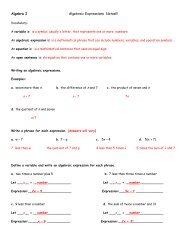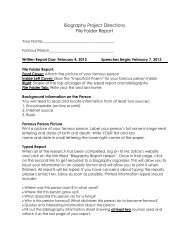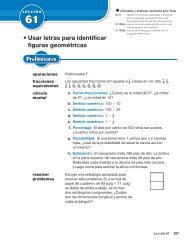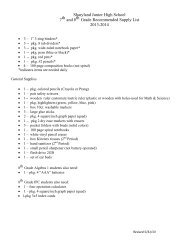Nintendo: The Company and its Founders - Sharyland ISD
Nintendo: The Company and its Founders - Sharyland ISD
Nintendo: The Company and its Founders - Sharyland ISD
Create successful ePaper yourself
Turn your PDF publications into a flip-book with our unique Google optimized e-Paper software.
NINTENDO<br />
HANAFUDA<br />
Hanafuda playing cards were<br />
the sole source of <strong>Nintendo</strong>’s<br />
business for nearly 100 years,<br />
<strong>and</strong> the company still makes<br />
hanafuda today. Hanafuda<br />
come in decks consisting of<br />
12 different su<strong>its</strong> of four cards<br />
each, for a total of 48 cards<br />
per deck. <strong>The</strong> su<strong>its</strong> are named<br />
after the month in which a<br />
particular flower blooms, <strong>and</strong><br />
pictures of the flowers are on<br />
each card. Hanafuda cards are<br />
much thicker <strong>and</strong> smaller than<br />
Western playing cards.<br />
In the early days, making<br />
the cards began with pounding<br />
the bark from a mulberry<br />
tree into a paste. <strong>The</strong> paste<br />
was mixed with clay <strong>and</strong><br />
shaped into layers. <strong>The</strong> layers<br />
were pushed together to create<br />
the hard back of the card.<br />
When dry <strong>and</strong> cut, the cards<br />
were painted with color inks.<br />
<strong>The</strong>n, they were packaged <strong>and</strong><br />
sold. Hanafuda means “flower<br />
cards.”<br />
images painted on them. <strong>The</strong>se<br />
symbolic images stood for different<br />
things, such as good fortune or<br />
long life. Hanafuda were used for<br />
playing matching games <strong>and</strong> more<br />
complicated card games.<br />
When Yamauchi chose the<br />
company name, <strong>Nintendo</strong> Koppai,<br />
he used kanji characters. <strong>The</strong>se are<br />
a type of Chinese lettering that is<br />
also used in Japanese writing. Each<br />
kanji character in nin-ten-do koppai<br />
has meaning. <strong>The</strong> company name<br />
means, “Leave luck to heaven.”<br />
Yamauchi’s cards must have<br />
been very well made, because they<br />
became the most popular cards in<br />
Kyoto. Yamauchi’s business was<br />
blossoming, <strong>and</strong> when the Japanese<br />
mafia, or yakuza, began using<br />
hanafuda in gambling casinos, his<br />
business boomed. Gamblers used<br />
a lot of cards because they started<br />
each game with a br<strong>and</strong>-new deck.<br />
With the dem<strong>and</strong> for<br />
hanafuda increasing, Yamauchi<br />
16

















